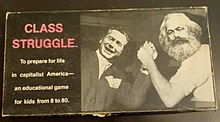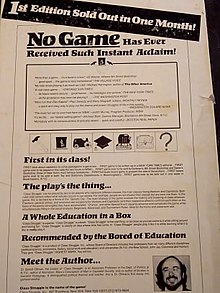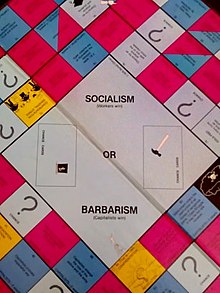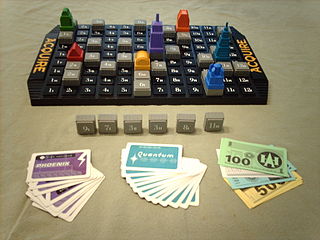
Acquire is a board game published by 3M in 1964 that involves multi-player mergers and acquisitions. It was one of the most popular games in the 3M Bookshelf games series published in the 1960s, and the only one still published in the United States.
Rail Baron is a railroad board game for 3 to 6 players.
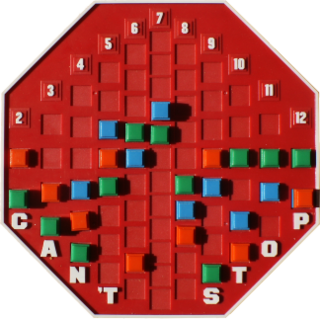
Can't Stop is a board game designed by Sid Sackson originally published by Parker Brothers in 1980; however, that edition has been long out of print in the United States. It was reprinted by Face 2 Face Games in 2007. An iOS version was developed by Playdek and released in 2012. The goal of the game is to "claim" three of the columns before any of the other players can. But the more that the player risks rolling the dice during a turn, the greater the risk of losing the advances made during that turn.
Anti-Monopoly is a board game made by San Francisco State University Professor Ralph Anspach in response to Monopoly. The idea of an anti-monopoly board game dates to 1903 when Lizzie Magie created The Landlord's Game, which later inspired Monopoly.

Advance to Boardwalk is a 1985 spin-off of the Parker Brothers board game Monopoly.
Marxism is a political philosophy and method of socioeconomic analysis. It uses a dialectical and materialist interpretation of historical development, better known as historical materialism, to analyse class relations, social conflict, and social transformation. Marxism originates with the works of 19th-century German philosophers Karl Marx and Friedrich Engels. Marxism has developed over time into various branches and schools of thought, and as a result, there is no single, definitive Marxist theory. Marxism has had a profound effect in shaping the modern world, with various left-wing and far-left political movements taking inspiration from it in varying local contexts.

Hare and Tortoise is a Eurogame designed by David Parlett in 1974 and first published by Intellect Games. In 1978 it was released by Ravensburger in Germany, and received generally positive reviews critically and won the 1979 Spiel des Jahres. It has since sold some 2 million units in at least ten languages. The current editions are published by Gibsons Games in the UK, Ravensburger in Germany and Rio Grande Games in the United States.

Wizardry: Proving Grounds of the Mad Overlord is the first game in the Wizardry series of role-playing video games. It was developed by Andrew C. Greenberg and Robert Woodhead. In 1980, Norman Sirotek formed Sir-Tech Software and launched a beta version of the product at the 1980 Boston Computer Convention. The final version of the game was released in 1981.
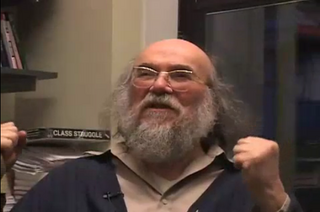
Bertell Ollman is a professor of politics at New York University. He teaches both dialectical methodology and socialist theory. He is the author of several academic works relating to Marxist theory.
Snit's Revenge is a two-player board game developed and illustrated by Tom Wham. It originally appeared as an insert in Dragon Magazine in 1977, and subsequently as a boxed game first published by TSR, Inc. and currently by Steve Jackson Games. The Steve Jackson version comes boxed together with Snit Smashing, which was also first published in Dragon Magazine and to which Snit's Revenge is technically a sequel. The rules of this version differ slightly from those of the TSR version.
Sherlock Holmes: Consulting Detective is a game originally published by Sleuth Publications in 1981. Multiple expansions and reprints of the game have since been released.

Conquistador, originally subtitled "The Age of Exploration: 1495–1600", is a board game published by Simulations Publications, Inc. (SPI) in 1976 that simulates the exploration of the New World in the 16th century. Players take on the role of European countries sending expeditions to find gold and establish colonies. Although the design uses the trappings of board wargames such as a hex map, combat is not a major part of the game.
Orient Express is a crime fiction board game published by Jumbo and Just Games. The game is based on the 1934 novel Murder on the Orient Express by Agatha Christie. The game was designed by Jeff Smets and released in 1985. The game contains 10 different murder cases, each of which can be played only once. Five new plots were released in 1987.
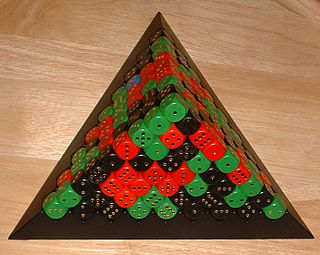
The Game is a dice game designed by Reinhold Wittig. It was first published in Germany in 1979, without rules and under the German name Das Spiel.

The Organization of Struggle for the Emancipation of the Working Class, or simply Struggle, also known by the earlier name Marxist Mojahedin, was a splinter group from the People's Mojahedin of Iran (PMOI/MEK).
Dialectical materialism is a materialist theory based upon the writings of Karl Marx and Friedrich Engels that has found widespread applications in a variety of philosophical disciplines ranging from philosophy of history to philosophy of science. As a materialist philosophy, Marxist dialectics emphasizes the importance of real-world conditions and the presence of functional contradictions within and among social relations, which derive from, but are not limited to, the contradictions that occur in social class, labour economics, and socioeconomic interactions. Within Marxism, a contradiction is a relationship in which two forces oppose each other, leading to mutual development.

Kevin B. Anderson is an American sociologist, Marxist humanist, author, and professor. Anderson is Professor of Sociology, Political Science and Feminist studies at University of California, Santa Barbara (UCSB). He was previously Professor of Sociology at Northern Illinois University, in DeKalb and Professor of Political Science, Sociology and Women's Studies at Purdue University.

4000 A.D. is a science fiction conquest board game published by Waddingtons in 1972.

Valley of the Four Winds is a fantasy board game published by Games Workshop in 1980 that is based on a serialized story that appeared in White Dwarf.
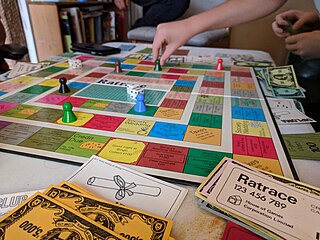
Ratrace is a family economic board game designed by Alfons Rubbens and published by Waddingtons in 1967. Described as "the madcap game of social climbing," players attempt to acquire status and cash in order to make their way from Working Class to High Society and become the wealthiest player by the end of the game.
